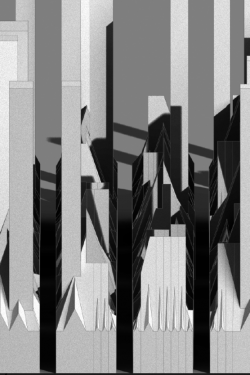In the Museum’s continuing series of Skyscraper Seminars exploring subjects of theory and practice for design professionals, Charles Waldheim discusses “The New Heliomorphism.” Recent projects by a number of leading architects and urbanists have suggested new forms of urban order through solar orientation. At the 2017 Chicago Biennial, Waldheim and a team from the Harvard GSD Office for Urbanization, with Siena Sharff Design, presented the installation Heliomorphic Chicago, which re-imagined the Loop’s buildings adjusted to a complex and contradictory economy of solar performance. In this talk, Waldheim will discuss a hypothetical Heliomorphic Manhattan, formulated on ideas of revising and extending the ecological urbanism agenda by returning to values of solar performance.
The topic of solar orientation and urban form is both perennial and, once again, timely. The discourses and practices of ‘ecological urbanism’ have turned our focus to the terrestrial topics of hydrological connectivity and ecological function. Heliomorphism proposes to revise and extend the ecological urbanism agenda by returning to solar performance. Recent projects a number of leading architects and urbanists have suggested new forms of urban order through solar orientation. In many of these projects, designers correlate the shape of the city to a complex and contradictory economy of solar performance.
The topics of solar orientation and social order, public health, and political economy were fundamental questions for many protagonists and projects of modern planning. In the wake of the collapse of modern planning, singular models of social urban order based on latitude and solar equity have given way to neoliberal models of market driven urbanization. The seminar returns to this archaic aspect of urban order, and presents its potentials through a range of planning policies and precedent projects.
Independent of location or latitude, access to the sun is considered an ancient and inviolable right in many cultures. The seminar reconsiders solar access in relation to social equity and it examines, accordingly, the tensions that exist between built form through capital accumulation and access to sunlight through environmental consensus. The energy crisis and economic shocks of the 1970s led to experimental and counter-culture practices of architecture and urbanism. The current environmental crisis embraces zero-carbon responses and has pushed the scale of operation to the scale of urban form.
Ralph Knowles’s concept of the ‘solar envelope’ proposed a design tool that anticipates contemporary interests in parametricism and relational modeling. The envelope offered a projective form through which urban morphology was indexed to solar performance. The technological developments of the last decade have enabled an unanticipated degree of precision and feedback, potentially infusing new possibilities into an idea that has a half-century of history. The seminar considers the changes, conceptual and projective, that contemporary models of computational geometry have brought to this design model.
Charles Waldheim is a North American architect, urbanist, and educator. Waldheim’s research examines the relations between landscape, ecology, and contemporary urbanism. He coined the term ‘landscape urbanism’ to describe the emergent discourse and practices of landscape in relation to design culture and contemporary urbanization. On these topics, he is author of Landscape as Urbanism: A General Theory and editor of The Landscape Urbanism Reader. Waldheim is John E. Irving Professor at Harvard University’s Graduate School of Design where he directs the School’s Office for Urbanization. He is recipient of the Rome Prize Fellowship from the American Academy in Rome; the Visiting Scholar Research Fellowship at the Study Centre of the Canadian Centre for Architecture; the Cullinan Chair at Rice University; and the Sanders Fellowship at the University of Michigan.
Charles Waldheim
Charles Waldheim is a noted architect, urbanist, and educator whose research examines the relations between landscape, ecology, and contemporary urbanism. He is the John E. Irving Professor at Harvard University’s Graduate School of Design, where he directs the School’s Office for Urbanization. Waldheim is the author of Landscape as Urbanism: A General Theory and editor of The Landscape Urbanism Reader, among many other publications.
